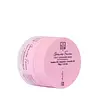What's inside
What's inside
 Key Ingredients
Key Ingredients

 Benefits
Benefits

 Concerns
Concerns

 Ingredients Side-by-side
Ingredients Side-by-side

Ethylhexyl Palmitate
EmollientCaprylic/Capric Triglyceride
MaskingPolyglyceryl-6 Dicaprate
EmulsifyingSynthetic Wax
AbrasiveStearic Acid
CleansingButyrospermum Parkii Butter
Skin ConditioningCamellia Japonica Seed Oil
EmollientSimmondsia Chinensis Seed Oil
EmollientSqualane
EmollientRosa Canina Fruit Oil
EmollientHelianthus Annuus Seed Oil
EmollientCalophyllum Inophyllum Seed Oil
AntimicrobialPelargonium Graveolens Flower Oil
MaskingTocopherol
AntioxidantRicinus Communis Seed Oil
MaskingTocopheryl Acetate
AntioxidantCitronellol
PerfumingGeraniol
PerfumingCI 16035
Cosmetic ColorantEthylhexyl Palmitate, Caprylic/Capric Triglyceride, Polyglyceryl-6 Dicaprate, Synthetic Wax, Stearic Acid, Butyrospermum Parkii Butter, Camellia Japonica Seed Oil, Simmondsia Chinensis Seed Oil, Squalane, Rosa Canina Fruit Oil, Helianthus Annuus Seed Oil, Calophyllum Inophyllum Seed Oil, Pelargonium Graveolens Flower Oil, Tocopherol, Ricinus Communis Seed Oil, Tocopheryl Acetate, Citronellol, Geraniol, CI 16035
Caprylic/Capric Triglyceride
MaskingEthylhexyl Palmitate
EmollientLauryl Laurate
Skin ConditioningCarthamus Tinctorius Seed Oil
MaskingHelianthus Annuus Seed Oil
EmollientPolyglyceryl-3 Laurate
EmulsifyingPolyhydroxystearic Acid
EmulsifyingHelianthus Annuus Seed Wax
Skin ConditioningTheobroma Cacao Seed Butter
EmollientButyrospermum Parkii Butter
Skin ConditioningGlyceryl Stearate Citrate
EmollientCetyl Alcohol
EmollientRosa Canina Fruit Oil
EmollientTetrahexyldecyl Ascorbate
AntioxidantCamellia Oleifera Seed Oil
Skin ConditioningRetinol
Skin ConditioningTocopheryl Acetate
AntioxidantPolysorbate 20
EmulsifyingCitrus Aurantium Bergamia Fruit Oil
MaskingCitrus Aurantium Dulcis Peel Oil
MaskingParfum
MaskingCaprylic/Capric Triglyceride, Ethylhexyl Palmitate, Lauryl Laurate, Carthamus Tinctorius Seed Oil, Helianthus Annuus Seed Oil, Polyglyceryl-3 Laurate, Polyhydroxystearic Acid, Helianthus Annuus Seed Wax, Theobroma Cacao Seed Butter, Butyrospermum Parkii Butter, Glyceryl Stearate Citrate, Cetyl Alcohol, Rosa Canina Fruit Oil, Tetrahexyldecyl Ascorbate, Camellia Oleifera Seed Oil, Retinol, Tocopheryl Acetate, Polysorbate 20, Citrus Aurantium Bergamia Fruit Oil, Citrus Aurantium Dulcis Peel Oil, Parfum
Ingredients Explained
These ingredients are found in both products.
Ingredients higher up in an ingredient list are typically present in a larger amount.
This ingredient is also known as shea butter. It is an effective skin hydrator and emollient.
Emollients help soothe and soften your skin. It does this by creating a protective film on your skin. This barrier helps trap moisture and keeps your skin hydrated. Emollients may be effective at treating dry or itchy skin.
Shea butter is rich in antioxidants. Antioxidants help fight free-radicals, or molecules that may harm the body. It is also full of fatty acids including stearic acid and linoleic acid. These acids help replenish the skin and keep skin moisturized.
While Shea Butter has an SPF rating of about 3-4, it is not a sunscreen replacement.
Shea butter may not be fungal acne safe. We recommend speaking with a professional if you have any concerns.
Learn more about Butyrospermum Parkii ButterThis ingredient is an emollient, solvent, and texture enhancer. It is considered a skin-softener by helping the skin prevent moisture loss.
It helps thicken a product's formula and makes it easier to spread by dissolving clumping compounds.
Caprylic Triglyceride is made by combining glycerin with coconut oil, forming a clear liquid.
While there is an assumption Caprylic Triglyceride can clog pores due to it being derived from coconut oil, there is no research supporting this.
Learn more about Caprylic/Capric TriglycerideEthylhexyl Palmitate, also known as octyl palmitate, is created from 2-ethylhexyl alcohol and palmitic acid. It is a fatty acid ester.
The fatty acid content of Ethylhexyl Palmitate makes it an emollient. Emollients help soften and hydrate your skin by trapping moisture within.
Ethylhexyl Palmitate is also used to help improve the texture of cosmetics. It helps other ingredient dissolve in products and help disperse ingredients more evenly.
You'll likely find this ingredient in sunscreen, as it is often used to mix UV-blocking ingredients such as avobenzone and ethylhexyl triazone.
It can also help stabilize the fragrances in a product as a fragrance fixative.
Ethylhexyl Palmitate can be used to substitute mineral oil.
Due to its high fatty acid content, it may not be fungal-acne safe.
Learn more about Ethylhexyl PalmitateHelianthus Annuus Seed Oil is the oil derived from the seeds of a Sunflower. Sunflower seed oil is non-fragrant. It is an emollient, meaning it helps to soften the skin.
Sunflower seed oil contains many fatty acids. The fatty acids found in sunflower seeds include (from highest amount to least): linoleic acid, myristic acid, palmitic acid, stearic acid, arachidic acid, oleic acid, and linolenic acid.
These fatty acids help the skin create ceramides. Ceramides play a role in repairing the skin barrier.
Helianthus Annuus Seed Oil helps moisturize the skin. This in turn helps the skin look more rejuvenated and smoother.
Sunflowers are rich in vitamin E.
Historians believe Indigenous cultures of North America domesticated sunflowers before corn. Thus they relied on sunflower oil for a variety of uses. One such use is moisturizing skin and hair.
Sunflower seed oil may not be fungal acne safe. We recommend speaking with a professional if you have any concerns.
Learn more about Helianthus Annuus Seed OilRosehip Oil is a non-fragrant plant oil. Rosehips are a fruit from a rose bush and are edible. This oil has skin conditioning and hydrating properties.
Rosehip contains Vitamin C, Vitamin E, fatty acids and linolenic acids. These nourish your skin barrier. Having hydrated skin may help reduce the appearance of fine-lines and wrinkles.
Another great component of Rosehip Oil is Vitamin A, or retinol. Vitamin A encourages your skin to create more collagen.
Rosehip oil may help with reducing pigmentation. The lycopene and beta-carotene have skin-lightening properties. However, more studies are needed to confirm this.
Learn more about Rosa Canina Fruit OilTocopheryl Acetate is AKA Vitamin E. It is an antioxidant and protects your skin from free radicals. Free radicals damage the skin by breaking down collagen.
One study found using Tocopheryl Acetate with Vitamin C decreased the number of sunburned cells.
Tocopheryl Acetate is commonly found in both skincare and dietary supplements.
Learn more about Tocopheryl Acetate